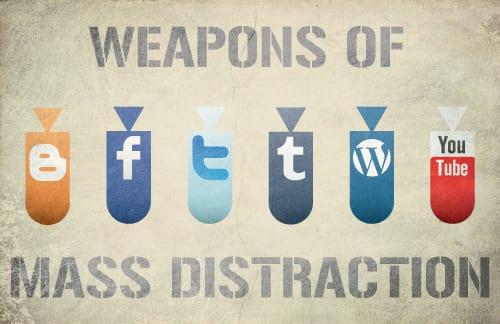In Part 1 of this series, I focused on information overload in the YouTube Culture, and steps you can take to manage this. In this part, you will read more about how to be selective in what you watch, and what else you can do to get the best out of watching online videos.
So Many Trees in the Forest
In Part 1 of this series, I talked about how easy it is to become overloaded with information these days and the negative impact this has on your productivity. There is no doubt that you must seek knowledge, and the immediate availability of YouTube videos definitely makes that easier. Maybe too easy sometimes. Whatever topic or medium of information you choose, you should always ask yourself whether you’re really benefitting or just passively taking in information.
Making an inventory, prioritizing and disconnecting are essential steps to take when you’re out there in the information jungle, but still, with all that’s available, being selective can be a real tough task. What you’ll want to avoid is picking up bits and pieces of information here and there and find that you can’t see the forest for the trees. Instead, go for information that’s both focused and comprehensive. Here are two more ideas to help you with that:
1. Books
There are video lectures that discuss or explain a particular book or other written materials. Make sure you have the book while watching. This way, the outline and the source of information are clear and straightforward, enabling you to stay focused. And you will also benefit from using more than one skill (listening/watching, reading) to process the information. Well-known basic books include ‘Kitab at Tawheed’, or an explanation of the ‘Forty Hadith of Imam an-Nawawi’.
2. Follow a program
Rather than jumping from video to video about one or more topics, choose the ones that are part of a program, or series. They usually aim to give you a deeper understanding of the topic, plus it will give you the satisfaction and motivation boost of having ‘finished something’. For example, try watching a complete series about the seerah of the Prophet  or the different Companions. You could find a program on how to learn to read and recite the Qur’an with tajweed (correct pronounciation), or benefit from a series on the tafsir (commentary) of the Qur’an.
or the different Companions. You could find a program on how to learn to read and recite the Qur’an with tajweed (correct pronounciation), or benefit from a series on the tafsir (commentary) of the Qur’an.
Bridging the Productivity Gap
Islam is a religion of striving to do good deeds, and whenever we feel that we are just consuming knowledge without benefitting much from it in terms of action, we should do the utmost to bridge that productivity gap.
“By the time. Verily, man is in loss. Except those who believe and do righteous deeds and recommend one another to the truth, and recommend one another to patience.” [Qur’an, Chapter 103, Verses 1-3]
With huge quantities of information so easily accessible, the Ummah has really seen a revolution in the ways of seeking knowledge about our religion. And as we’re trying to manage and make productive choices within this new YouTube culture, we should also look at ourselves critically. Could there be something in our attitudes towards watching video lectures that prevents us from reaping all the benefits?
Here are two more points to keep in mind if you want to bridge the productivity gap and maximize the benefits and blessings of seeking knowledge in the YouTube culture:
1. Take video lectures seriously and get active
Many people wouldn’t dream of going to a ‘live’ lecture of a Sheikh without taking notes or jotting down questions as he speaks, yet we have a much more passive attitude when watching a lecture on YouTube. Of course, the first thing you should do is to get your pen and notebook out, but don’t stop there, there’s more you can do.
- Go back to your notes and write a summary of the lecture.
- Make a list of action points based on the information in the video (and hold yourself accountable for sticking to them!).
And just like you would try to keep distractions to a minimum in any other lesson or lecture (by switching off your phone for example), do the same thing while watching a video lecture. Choose a suitabletime to watch video lectures and don’t try multitasking.
2. Don’t let the Ummah go solo
There is a trend towards individualism in the YouTube culture that we as an Ummah should recognize. A whole world of information is at our fingertips and we don’t have to leave our house, or even talk to someone for that matter. But this Ummah should be one of unity and brotherhood, and the social aspects of seeking knowledge can be such a great source of blessings, we shouldn’t let that pass.
Nu’man ibn Bashir reported: The Messenger of Allah  said:
said:
“The parable of the believers in their affection, mercy, and compassion for each other is that of a body; when any limb of it aches, the whole body reacts with sleeplessness and fever.” [Muslim]
Pursuing knowledge together can be so much more encouraging, motivating and, ultimately, productive than doing it all by yourself. So, try to get others involved and select, watch and discuss video lectures together. Compare your notes. Design a program or schedule together around a certain topic. Encourage one another to put knowledge into action. Help one another to achieve your goals and be successful in this life and the next.
I hope you’ve enjoyed reading this series about the YouTube culture and your productivity and have picked up some beneficial ideas. I’d love to hear your own ideas about this topic in the comments section below!




